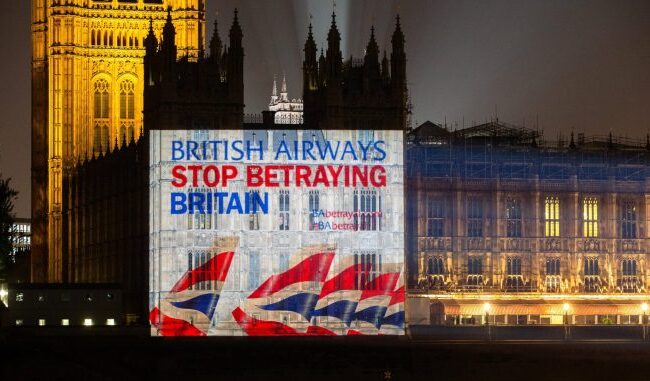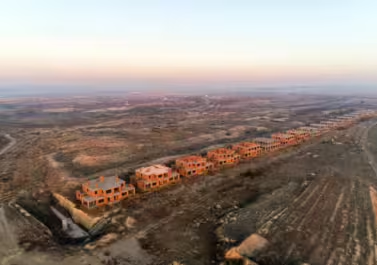Will they listen? And who is Britain?
British Airways announced that it would be sacking it’s entire workforce of 42,000 people and re-hiring three quarters of them on worse pay and contracts – up to a 12,000 would be made permanently redundant, and for those that get the new contracts, some of the longest serving cabin crew would see their pay slashed by up to 75%! The deadline for a union agreement has passed, leaving BA employees in limbo as to their employment status and what happens next. A good write up has been done about the current situation here [1], so we won’t repeat it in this article. Instead we will focus on: the general tendencies within airline/airport work; the role of the unions and their strategy going forward in this particular dispute; and what’s happening on the ground at Heathrow from a workers’ perspective.
As the pressure to choose between ‘jobs’ and a greener future increases, and companies use the corona crisis to savage workers’ contracts, how can a workers’ control agenda be useful? We will base this article on: discussions we’ve had with comrades who work at Madrid and Frankfurt airports; our reflections from a meeting organised by Unite Community about the situation at BA last week; and a report back from a current Heathrow worker.
Tendencies in aviation
Before corona at least, passenger numbers were increasing year on year. At one point in 2019 in Frankfurt Airport, the conveyor belts broke down under the weight of all the extra baggage! Soaring demand was used to justify airport expansion projects, like the third runway at Heathrow, which would add another 250,000 flights annually to the existing 470,000, worsen the already disastrous levels of local air pollution in the largely (migrant) working class western fringe around the airport, and destroy at least 800 homes. Despite this, mainstream unions backed the plan, citing the £18 billion plus investment will create between 50,000 and 110,000 jobs by 2030.
Unfortunately the promise of ‘more jobs’ doesn’t seem likely to translate into ‘good jobs’ if we look at the general trend in terms of pay and conditions across not just Heathrow, but most major airports across Europe. A comrade who works at Frankfurt airport told us about the large amount of new workers employed through temp agencies especially in 2019 to cope with the increasing passenger numbers and overwork. New subsidiaries and two-tier workforces are established, initially without union recognition and on worse contracts, such as the British Airways Mixed Fleet in 2010, made up of mostly younger cabin crew and customer service managers who are on much worse contracts than older BA employees. [2]
This most recent attempt to slash pay and conditions is just the latest in a series of disputes at BA, where the CEO, Willy Walsh, has made his long-term intentions clear about what kind of workforce he wants – basically a lower paid and more ‘flexible’ one. Mixed fleet workers staged walkouts in in summer 2017 to improve their paltry earnings. In summer 2019, 4000 BA security staff, airside operations staff and passenger services personnel across the airport’s five terminals went on strike over pay. Pilots also went on to strike after they rejected their final pay offer in September. And in the first three months of 2020, Heathrow baggage handlers employed by Global Baggage Solutions (GBS) went on strike five times, after not receiving a pay increase in 2019 and then a measly 32p pay offer. [3]
But it’s not just about one rogue airline. All airport workers across Europe were, before corona virus, facing a similar mix of increasing workloads, more ‘flexible’ contracts and stagnating pay. We have seen defensive actions to protect pay and conditions replicated across Europe over the last few years, including strikes by air traffic controllers in Spain in April 2019 and in France in May 2019. Since the cataclysmic drop in passenger flights after the corona virus lockdown, the majority of airline staff have been furloughed, meaning the government is subsiding their wages. We spoke to a comrade furloughed at Madrid airport who is only earning 700-99 euro a month, having to rely solely on the state to pay his wages during the epidemic, which is only at 70% of usual. Despite their legal entitlement to wages, many hundreds of thousands have not received them since they’ve been off work (from mid-March, beginning of April.)
Rather than being seen as a temporary situation, the aviation industry is using the lockdown to their advantage, in order to push through redundancies and then re-hire workers workers on worse contracts afterwards. This is seen as even more galling when they are getting such financial assistance from the government – either through the payment of employees’ wages, tax relief or favourable financial deals and securities.
In terms of workers’ responses to the recent sackings post corona virus, we have only heard of protests at Naples airport and Poland. But with the sledge-hammer tactics being used by employers, there is an increasingly strong sense of discontent, despair and anger amongst workers.
All of this is a telling picture of the changes to airport employment over the last 20 years. Previously a ‘job for life’, airports around the world have increasingly become employers to a more precarious and low-paid workforce. Their strategic and economic importance undoubtedly gives them high potential power, which ironically is why airports from the 80s onwards have sought to break up their collective strength through sub-contracting, using agencies and zero-hours contracts, and pushing pay to the bare minimum. Unions have been unable or unwilling to counter these offensives, usually making an agreement that isn’t as bad as the original offer on the table, meaning that both sides can claim victory. A third of managerial roles have already been axed by BA, and they just announced another 500 airport ambassadors were in for the chop [4].
The ‘betrayals’
It is not surprising then that come corona in Spring 2020, the opportunity was going to be used to further put pressure on employees’ terms and conditions. In Austria the Ryanair subsidiary Laudamotion threatened to sack 300 permanent and 200 temporary workers if the union would not agree to massive wage cuts. [5 ] At the end of May, EasyJet announced it was making 30% of its entire workforce redundant, while Emirates has announced the same. BA made its announcement. Construction workers at Manchester Airport were laid off without pay and some were sacked for raising safety concerns. In Germany Lufthansa is threatening to sell its catering subsidiary LSG. The LSG plant in Frankfurt is supposed to be relocated to the Czech Republic, where workers from the Philippines would produce the airline meals for 3 euros an hour. (The produced meals would then be sent in a 360km truck journey back to Frankfurt – more unnecessary environmental damage to undermine wages!) We spoke to friends who drive cargo-trucks at Heathrow airport. During the Covid-19 lockdown they were extremely busy, as they had to unload the PPE shipments coming from China. Cargo flights have been less affected by the lockdown, but still, BA threatens to sack many drivers. They basic aim is to get rid of drivers on old contracts, who earn nearly double as much as newly hired ones. IAG, the owner of BA singled out their UK arm for the cuts, which ironically makes up 66% of the group’s profits. If more evidence was needed that this was simply a cynical attempt at cost-cutting, it comes at the same time that IAG is trying to buy another airline for a billion euros.
Union responses to the BA announcement
With such a savage agenda of redundancies and cuts in the pipeline, now is the time for the unions to show their mettle! However, the response has been predictably underwhelming. Unite are the main union contenders at Heathrow, having the most members and seemingly good level of organisation in terms of slick brochures on their aviation ‘strategy’, concrete demands and some templates for action and ‘leverage’. All the unions make sure they say that they understand that the airline industry is having a tough time of it (only 3% of flights are running compared to this time last year), and that less workers are currently needed. They want to seem reasonable after all. But they are unanimous in their verdict that the redundancies were a pretext to re-hire workers later on worse terms and conditions, as well as the fact that BA has used taxpayers’ money and the government’s furlough scheme to keep cash in the company, whilst planning this onslaught on workers’ jobs at the same time.
The campaign of ‘resistance’ (Unite Community meeting)
I attended a meeting recently about the current situation at Heathrow organised by Unite Community branch. In attendance were the regional officer from GMB, officers and reps from Unite and GMB at Heathrow, as well as Unite Community members (largely ex- unionists), and the usual MP contingent, Ruth Cadbury and John McDonnell. My main intention was to find out what exactly the plan of action was. Unfortunately, 70% of the airtime was given over to the ‘political strategy’, 25% of how appalling and badly behaved BA are and what a terrible human being Willy Walsh is, and only 5% (if that!) on ‘industrial strategy’. I thought it was a pretty good snapshot of where the mainstream trade unions are at the moment. Heathrow workers were conspicuous in their absence during the discussion. I didn’t get a sense of what the workers were willing to do to challenge BA’s plan, nor if the unions had even attempted to organise mass meetings with their members to discuss their options. I did raise the questions of that the union’s industrial strategy would consist of, but the only things that I heard were:
1. One gung-ho GMB regional officer saying ‘We just need to all go on strike’ and for workers to stick together. A welcome sentiment, and at least someone mentioned the ‘s’ word! However, there with no mention of how actually you do this when most workers are furloughed!
2. GMB officers emphasising ‘unions have to work together’ – primarily because Unite is way bigger than them and without them, they’re small fry. Funnily enough, Unite didn’t make similar proclamations of cross-union working.
3. One Unite rep said that workers are in a weak position because of being furloughed, thus side-stepping the issue of workers’ collective action on the job altogether.
Another Unite rep who looks after airline caterers was also at the meeting. She informed us that the airline caterers, Alpha LSG and Gate Gourmet, with some of the worst track records on bad behaviour, are using corona as a pretext to cut 50% and 35% of the workforce/hours – but again,
no word on what the union strategy was going to be in light of these announcements. Instead, the main focus from most speakers seems to be on community campaigns, reaching temples and mosques, ‘getting the message out’, and pressuring MPs and the government to act to save jobs. My impression was that they were putting all their eggs in one basket: a PR/media strategy that bad-mouthed BA and designed to put pressure on government to act on behalf of workers. The BA Betrayal campaign website [6] features the usual banner drops with a small handful of union activists, media clips, and workers’ testimonials that portray them simply as victims. It’s difficult not to read this all cynically as a theatre for the negotiations which will happen behind closed doors.
On the BA Betrayal website, the only ‘rebellion’ is stated as coming from the MP’s! As far as this PR strategy goes though, it isn’t doing too badly as stories are being drip-fed to the media pretty successfully: on June 13th, headlines were about BA being labelled a ‘national disgrace’ by MPs of the Transport Select Committee’s inquiry. As if nationalism really means much to the bastions of global capital! Len McCluskey called the plans “unlawful and immoral” – as if morality has any currency in the hearts of business owners! Making the moral argument especially didn’t seem to be the most effective strategy when people at the Unite meeting pointed out more than once what a terrible human being Willy Walsh was. Doesn’t seem like he’ll lose much sleep over the plight of his workers. Labour leader Starmer is now urging the Government to bring forward a rescue deal to save thousands of aviation jobs amid the coronavirus pandemic. The question is, can this battle -which relies on moral and nationalistic pressure – be won simply through a top-down media campaign, and with a government and ruling class who clearly don’t give a shit about taking the moral high ground?
Having looked a bit deeper into Unite’s position, they have a few other demands up their sleeve. They have released a so-called ‘radical blueprint’ for the aviation industry [7] which, amongst other things, wants a “bespoke government financial package for the airline industry” in order to save airports (especially the smaller ones), jobs, routes and airlines. They write: “Other governments have already intervened to protect their aviation industries, most notably in the US with a $55 billion cash injection but also across Europe and Asia. As an island nation, it is imperative that the UK government does the same.” The fact that they want a government bailout of an industry that actually needs to shrink seems short-termist, and reflects their weakness when it comes to: a) their commitment to climate change policies and b) actually following through with their argument that these airlines have made billions in profit over the years, and can well afford to weather this story – at least during corona.
What are the alternatives?
What would really be ‘radical’ is surely to get workers together to discuss how they think it best to deal with the fact that in the future, they should be out of a job. How do they want to use their skills for socially beneficial or ‘greener’ futures? This is an opportunity to open the door for some level of workers’ control – something that is totally bypassed by the unions in their endeavour to remain ‘relevant’ around the negotiating table – a table which, according to the speakers in the Unite Community meeting I attended, was totally unwilling to listen to ‘reason’ from the union’s side anyway.
The Unite Aviation strategy also includes details like: government loans to the industry being fully repayable; companies that use the loan scheme being prohibited from paying dividends to shareholders or buying back shares until 12 months after the loan has been repaid; executive pay being capped; nationalisation or public private partnerships to keep regional airports running – even though they have been running at a loss for some years now. While these seem reasonable demands, we would point out that these recommendations point to a massive failed opportunity to really engage with the jobs versus health/climate catastrophe trap that many workers are facing, even more acutely during the corona pandemic. Many simply dismiss the jobs argument, saying that the planet is worth more. But surely we cannot sell the many low-paid airport workers down the river in order to secure a greener future? People still have to eat. As working class revolutionaries we have to go back to basics – we have to put the question of workers’ power in the foreground. Only workers who are able to defend themselves against the current attacks together will be able to discuss about a greener future. Without struggle, no collectivity. Without collectivity, no workers’ voices. Without workers’ voices, no ideas about how to get out of the mess.
It might seem difficult to imagine thousands of workers getting together to discuss what they want for a greener, more sustainable and healthier (work) life. But crises like corona (and even the third runway before it) open up spaces in which they not only can happen, but should. If unions cannot be at the forefront of this – then what are they for? If it is just to stave off the absolute worst excesses of capitalism’s endless drive for profits, then the bar is set dangerously low. It is more difficult to imagine that workers play a central role in how society is organised when they have so little say in the daily work life as it currently stands. At Heathrow at least there have been some strikes in recent years. However, this does not really tell us whether workers feel like they have a say over what the union does, whether they feel they are in the driving seat, whether they feel confident and informed enough to go on the offensive, whether their own actions build a sense of unity amongst themselves to change day to day things like timetables, work targets, break times etc.
So what would we like to see happen with regards to the current situation at Heathrow? Firstly, a proper industrial strategy that puts workers in the driving seat. This means mass meetings with an agenda that is offensive rather than merely defensive, led by workers rather than politicians. We’d like to see the knowledge and structure of the workforce put to good use: even through mass strikes amongst all the workforce is unlikely to have much impact if workers are furloughed, what about cargo? Heathrow transports 1.4 million tonnes of air freight. London airports account for 77% of UK’s air freight traffic and air freight accounts for about 40% of the value of UK imports and exports. Are workers currently engaged in cargo operations being consulted about possible strike action to defend the entire workforce?
Having spoken to a current Heathrow worker, the current indications are not very hopeful about a worker-led offensive fightback, although this could change if workers decided to take matters into their own hands! When I shared my thoughts with them about the Unite Community zoom meeting on the subject, he wrote back the following thoughts.
Reality on the ground – report from Heathrow worker
“The snapshot you got from that zoom meeting is pretty much the reality on the ground at Heathrow. Although 5% industrial strategy might be an over estimate. It’s mainly advocacy. A little mobilising. No organising. There has been no mass or even smaller departmental meetings to my knowledge, even though this is perfectly possible in most areas. We work in large office spaces, aircraft hangars and massive warehouses. All of the shop floor staff I’ve spoken to are loosely aware of the union’s strategy. But they complain of not really knowing what’s going on. Of feeling in limbo and not in control of the dispute. It speaks volumes about the union’s strategy, which has not prioritised a worker directed campaign, but instead placed full emphasis on a political and media strategy, that has diminished the workforce’s role to that of spectators. Staff usually speak about the union as something separate from themselves. “The “union” is talking to the company.” Never “we.” There is a sense of fatalism in the air. Lots of talk about what the company might do, little or no discussion about what staff are willIng to accept. The union’s strategy seems overly defensive. The workers bargaining position has doubtless in some ways been weakened, but I’m sure that if all the workforce’s incontestable knowledge and expertise was drawn upon, they would be able to decide which tactics would be best placed to apply the pressure required to meet their objectives. There appears to be avenues for disruption. There are some passenger flights going, the maintenance still needs doing, the training is ongoing and BA are probably relying on cargo a fair bit at the moment. The company are being unashamedly ruthless and the union need not waste too much time pointing this obvious fact out, but should be offensively making the case for a winding down of the airports operations in a way the benefits the workforce and the environment.
From what I’ve heard about the reps, some sound complacent. They’ve said things like “yeah….we’ll all probably end up doing our own thing. Crew, pilots, engineering…….etc.” And another remarked: “I don’t know what the other union’s doing really.” I know of a case where a sub-contractor has offered to help out in any way needed and has not been contacted by the union. In a dispute like this surely unity is key? The union’s are only mobilising a handful of staff to hold a banner for the odd photo op. They keep projecting the BA Betrayal hologram on to famous buildings and photographing it in front of empty lockdown streets, then brief the media about the mental health of the workforce. The workforce are mainly absent from all this activity. The PR campaign is a strange contrast to the somewhat subdued atmosphere at Heathrow.
The union’s approach not only fails to organise, educate and utilise the workers, it also appears risky. If it ‘succeeds,’ BA won’t put all their staff on zero hours contracts and cut their pay by 70%, but that clearly isn’t their intention. Workers I’ve spoken to agree. BA are just setting the bar incredibly low, so they can take some of their benefits and permanently cut some of their pay and can then sell it as being reasonable. Unless the union win massively and shames the company into oblivion, it’s possible that BA can just weather the storm. The strategy relies too heavily on the public spontaneously boycotting the airline or parliament legislating the problem away?
We need unions capable of seizing the opportunities moments such as these throw up. With billions of pounds of tax payers money being spent globally to prop up the aviation industry and with the mounting evidence that the destruction of our environment has played a significant role in the creation of the pandemic, the argument for investment in greener jobs against airport expansion seems clear.”
[1] https://www.wsws.org/en/articles/2020/06/19/bair-j19.html
[2] Most mixed fleet workers earn between £23,000 and £28,000 a year, the new plans will mean all cabin crew will be put onto contracts worth £24,000, meaning a pay cut for even the most badly paid workers!
[3] There has been a long-standing dispute between baggage handlers and GBS over wages, as in November 2018, Heathrow Airport announced that all its employees, even those that were sub-contracted, should be paid the London Living Wage (LLW). The promise was not uniformly adhered to.
[3] https://unitetheunion.org/news-events/news/2020/june/heathrow-airport-accused-of-brutally-ditching-ambassadors-with-500-workers-set-to-lose-their-jobs/
[4] https://unitetheunion.org/news-events/news/2020/june/heathrow-airport-accused-of-brutally-ditching-ambassadors-with-500-workers-set-to-lose-their-jobs/
[5] After a bit of back and forth, the union signed new contracts: 1,440 Euros before tax for cabin crew workers, 2,000 Euro for co-pilots.
[6] https://babetrayal.com/
[7] https://unitetheunion.org/media/3082/9086_ukaviation_booklet_a4_final-4.pdf



